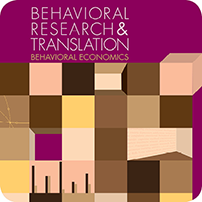Social Discounting and Its Implications in Game Theory


Howard Rachlin, Stony Brook University
Howard Rachlin obtained a Ph.D. in psychology at Harvard University in 1965. He is currently a research professor and an Emeritus Distinguished Professor of Psychology at the State University of New York at Stony Brook. He has published more than 100 articles, written six books including Behavior And Mind (Oxford University Press, 1994) and The Science of Self-Control (Harvard University Press, 2000), and edited two others. He has served on study sections for The National Institutes of Health (NIH) and The National Science Foundation (NSF). He is on the editorial boards of six journals. Since he received his Ph.D. his research (on choice, self-control, social cooperation, and experimental economics) has been continuously supported by grants from NIH and NSF including an NIH MERIT award. Among other honors he has been elected fellow at the American Psychological Society and the Society of Experimental Psychologists. He has been the recipient of a James McKeen Cattell Fellowship (1975-76), and an Award for the Impact of Science on Application from the Society for the Advancement of Behavior Analysis (2005). He was a visiting scholar at the Russell Sage Foundation (1988-89) and an invited speaker at the Nobel Symposium on Behavioral and Experimental Economics, Stockholm, Sweden (2001).
Abstract: A human delay discount function measures overlap between the interests of a person now and that same person's interest later; the steeper a person's delay discount function is, the more impulsive (less restrained) she is. A human social discount function measures overlap between the interests of a person now and those of another person now; the steeper a person's social discount function is, the more selfish (less altruistic) he is. Just as delay discount functions are obtained by asking people to choose between smaller rewards for themselves now and larger rewards for themselves at later times, social discount functions are obtained by asking people to choose between smaller rewards for themselves now and larger rewards for other people now at various social distances.
In typical game theory analyses, each player is assumed to value only immediate or delayed rewards with delayed rewards being discounted. Looking at games from the viewpoint of social discounting, benefits from immediate and discounted delayed rewards to the player would be supplemented by discounted rewards to the other player or players. Given social discounting, degree of cooperation by Player-A would be predicted to increase as a function of the amount of reward to the other players or the number of other players receiving benefits (all else held constant), consequent on cooperation. This prediction was confirmed in experimental tests.